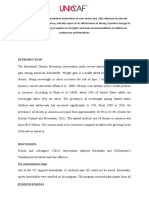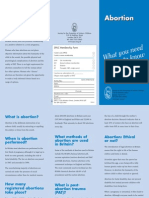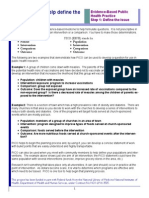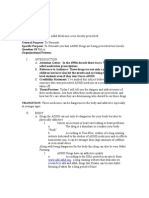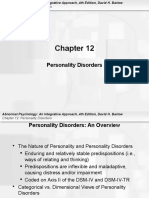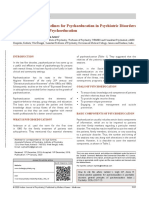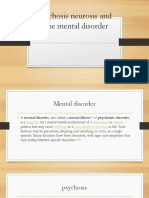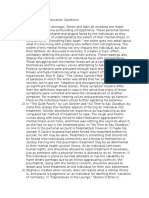Research Papper On Eating Disorders
Research Papper On Eating Disorders
Uploaded by
api-241735250Copyright:
Available Formats
Research Papper On Eating Disorders
Research Papper On Eating Disorders
Uploaded by
api-241735250Original Title
Copyright
Available Formats
Share this document
Did you find this document useful?
Is this content inappropriate?
Copyright:
Available Formats
Research Papper On Eating Disorders
Research Papper On Eating Disorders
Uploaded by
api-241735250Copyright:
Available Formats
Aryal Gansowski November 20, 2013 English 101 Research paper
Eating disorders Imagine not being able to control the way you eat. Control what you eat or how much. Instead of enjoying your food you count every calorie, every bite. You dont worry about taste, or if you like it. You worry about what people will think if they see you eating. Imagine looking in the mirror at your 5 foot 75 pound body, every bone sticking out of your skin. Looking like youve been sick or deprived from nutrients for months and even years. When you look in the mirror you dont see what everyone else sees, a girl starving herself for everyones approval. You see a woman in the mirror 300 pounds at least staring back at you. Youd do anything to feel normal, look like everyone else. Whatever it takes. Weather it means starving yourself or binge eating and vomiting it all up later. This is what people with eating disorders go through every single day. An eating disorder is defined as any of a range of psychological disorders characterized by abnormal or disturbed eating habits. In other words an eating disorder is when someone has trouble psychologically and this causes their eating habits to be weird or disturbed. There are many different types of eating disorders. Although anorexia nervosa and bulimia nervosa are the most heard of maybe even most common, they are not the only types of eating disorders. There
are four different types of eating disorders. Anorexia nervosa, bulimia nervosa, binge eating disorder, or eating disorders not otherwise specified (ed-nos). Each of these different branches has something that makes them unique in their own way. Anorexia nervosa is probably one of the most heard about eating disorders. Anorexia nervosa is an eating disorder where the victims starve themselves and excessively exercise. Anorexia has many different symtoms. Some of the symptoms of anorexia are showing resistance to maintain normal body weight, fear of gaining weight even though normal or underweight, loss of menstrual cycle and hair and many more. A lot of people who suffer from anorexia are in denial about what they are actually doing to themselves. Anorexia has many warning signs also. Some of the warning signs of anorexia include, dramatic weight loss, always worried about counting calories, fat grams and are what seems to be obsessively dieting, refusing to eat certain foods. Victims of anorexia also have major anxiety over weight gain, denial of hunger and an unhealthy need to burn off calories. Self- starvation and anorexia go hand in hand. People with anorexia deprive their body from the proper nutrients it needs to do every day activities. So there body has to slow down. This slowing down can have serious health consequences on the body. Some of these health problems include kidney failure, muscle weakness, reduction of bone density, even heart failure which can result in death. Anorexia nervosa is a very serious medical condition, and it just one of the many eating disorders. (nationaleatingdisorders.org/anorexianervosa) Bulimia nervosa is also a very serious type of eating disorder. Bulimia nervosa is known as people who self-induce vomit to make up for the consequences of binge eating. Some of the symptoms for bulimia nervosa would include, a regular intake of large amount of foods, this is usually accompanied by loss of control over eating behaviors, Regular use of behaviors to help
them cope with their binge eating. Such as laxative use, self-induced vomiting, fasting, or obsessive compulsive exercise. Another symptom of bulimia is extreme concern over body weight and shape. Bulimia has many warning signs also. Evidence of binge eating, which would include disappearance of large amounts of food in a small amount of time, evidence of purging behavior which is frequent trips to the bathroom right after eating. They may seem longer than usual. They feel the need to burn off excess calories. Unusual swelling of jaw and calluses on back of knuckles due to self induced vomiting are just a few of the warning sign that accompany bulimia nervosa. Bulimia nervosa is very serious and can be extremely harmful to the body. The binging and purging on a regular basis can lead to electrolyte and chemical imbalances that may have effect in major organs in your body including the heart. (nationaleatingdisorder.org/bulimianervosa) Eating disorders not otherwise specified or (ed-nos) are not very heard of. People who suffer with and ed-nos have a variety of symptoms for anorexia as well as bulimia. Anorexia nervosa and bulimia nervosa involve extreme emotions that are surrounded by food and weight issues. Before being diagnosed with an ed-nos the symptoms of bulimia and anorexia should be looked at. Examples of ednos include having all the symptoms of anorexia but still receiving your menstrual period or being normal or above normal weight. Purging but not binging, in other words throwing up but still eating normal amounts. Purging or other commentary behavior that occur less frequently than someone who has bulimia. Even chewing large amounts of foods but spitting out and not swallowing. Ed-nos sufferers are not usually heard of because they do not meet all of the symptoms for just one eating disorder, they meet it for many. (nationaleatingdisorders.org/eating-disorders-not-otherwise-specified-ednos)
Binge eating disorder is a common form of an eating disorder not otherwise specialized. Bing eating disorder is most recognized by recurrent binge eating without doing anything to compensate for it. People with binge eating disorder may suffer from eating large amounts of food in a short period of time. Feeling like they are out of control of behavior while they are binging. These viticims often feel guilty or disgusted by their own behavior. They may also eat when they are not hungry, may insist in eating along because they are embarrassed of the among they consume, or they keep eating until they are uncomfortably full. Those were just a few of the symptoms that people with binge eating disorder may have. Binge eating disorder is mostly associated with people who are overweight or obese. They may suffer from high blood pressure, heart disease, diabetes and many more. Although binge eating disorder is not a much known eating disorder it still shouldnt go untreated. (nationaleatingdisorders.org/binge-eating-disorder) These eating disorders have many alarming statistics. Almost 50% of those who suffer with any type of eating disorder meet the criteria for depression. Only 1 in 10 viticims who suffer with an eating disorder receive some sort of treatment. Eating disorders take place all over the world. 24 million people within the United States suffer from an eating disorder. Even though a majority of the victims are women there are men who suffer from eating disorders as well. An estimated 10-15% of anorexia sufferers are male. Men are less likely to seek treatment for eating disorders because they view it as a womans disease. As you know eating disorders are life threatening. The mortally statistics are as follows: 4% for anorexia nervosa, 3.9% for bulimia nervosa, and 5.2% for eating disorders not otherwise specialized. Even though they have the lowest death rates of most mental diseases, there are still people who die from this every day. (anad.org/get-information/about-eating-disorders/eating-disorders-statistics)
As you can see eating disorders are a very serious psychological disease and you many wonder where it all began. There are cases of eating disorders that date back hundreds of years. These symptoms were perceived as what was normal for each era. There are stories of people starving themselves which is a symptom of anorexia, but there arent that many of bingepurging which could relate to bulimia. There are stories of vomiting after eating that date back to the roman period. It wasnt until the European cultures were influced by western era religion that fasting and starving became more common. (Latzer, Merrick, stein, 2011) Even though eating disorders became more common when Hollywood came about and movies which portrayed a certain body image. Syptoms of eating disorders did in fact start hundreds of years ago. To gather some more information on the subject of eating disorders. I conducted an interview with a friend of mine who has suffered from bulimia nervosa. She has gone through a lot and although has had help and treatment had told me she still suffers every day. For my first question I decided to get right to the hard stuff. I asked her when she first started binging and purging. Although I grew up a little heavier than most kids, I never thought of myself as any different. Until one day in 8th grade I was at lunch and this boy looked at me and said you dint need to eat that fatso. My friends insisted that I ignore him, but I ran right to the bathroom after that, and forced my fingers in my throat and up came what little lunch I ate. After that I did it once a week, then every day. I joined sports to exercise and convinced myself that I needed extra training. I would tell my parents that practice would run late so they werent suspicious My next question was, when did you first realize this was a problem? When I was 16. A few of my friends wanted me to go out after volleyball practice, but of course I said no I had to go home. When in reality I just wanted to stay and exercise. One of the girls had forgotten there bag and came back in to find me exercising. I tried to come up with every excuse but she still managed to
drag me out. We went out to a friendlys and after eating I immediately went to the bathroom. The same friend who found me in the gym heard me in the bathroom and figured out what was going on. Think about how hard that must have been for her to be so vulnerable. My next question was how did you come to get help? Well to be honest I never wanted to get help at all. My mom actually found me one thanksgiving dinner. In the bathroom, in my usual glory. She then dragged me to counseling. Im glad she did though because my life is changed for the better. The interview changed my perception on eating disorders a lot. I used to think that it was something they did because they wanted to, but in reality, it dictates their whole life. Its something you cannot really control, Eating disorders are very serious medical conditions that can lead to health consequences and even death. Men and women of all ages suffer from eating disorders. It is said that eating disorders are the cause of movies and television. Young girls and women see this as a way you are saposed to look. (Fox-Kales, 2011) Many of these people are unaware that there is even a problem. Anorexia, bulimia, and ed-nos all have different symptoms and are all equally as serious. Luckily there are many counseling and treatment centers that these patients can go to for help. Eating disorders are a large problem around the world. We need to raise awareness of the symptoms and the seriousness of eating disorders.
Bibliography -George, Sarah. Personal interview. 15 Nov. 2013 -Latzer Yael, Merrick Joav, Stein Daniel: Integrating Culture, Psychology and Culture. Hauppauge. Nova science publishers inc, 2011 -Fox-Kales, Emily: Body Shots Hollywood and the Culture of Eating Disorders. Albany. State University of New York press, 2011 -bulimia nervosa anorexia nervosa Eating disorders not otherwise specialized (ed-nos) Binge Eating Disorder Nationaleatingdisorders.org 11/20/2013 http://www.nationaleatingdisorders.org/general-information -eating Disorder Statistics anad.org 11/20/2013 http://www.anad.org/get-information/abouteating-disorders/eating-disorders-statistics/
You might also like
- Research Paper Final Draft 1Document7 pagesResearch Paper Final Draft 1api-512162182No ratings yet
- Final Argument EssayDocument5 pagesFinal Argument Essayapi-242071284No ratings yet
- Designing Health Promotion ProgramDocument10 pagesDesigning Health Promotion ProgramThe HoopersNo ratings yet
- Rough Draft FinalDocument12 pagesRough Draft Finalapi-451554067No ratings yet
- Exploratory Essay Draft 2Document3 pagesExploratory Essay Draft 2api-358044397No ratings yet
- 1989 The Revised Diagnostic Interview Zanarini1989Document9 pages1989 The Revised Diagnostic Interview Zanarini1989Cesar Cantarutti0% (2)
- Questions:: Assessment 2Document11 pagesQuestions:: Assessment 2Soumyadeep BoseNo ratings yet
- Anorexia Research PaperDocument6 pagesAnorexia Research Paperapi-273806201100% (1)
- Social Media Usage and Development of Psychiatric Disorders in Childhood and AdolescenceDocument15 pagesSocial Media Usage and Development of Psychiatric Disorders in Childhood and AdolescencerexforthNo ratings yet
- Health Education On Elderly PDFDocument25 pagesHealth Education On Elderly PDFReyta Noor100% (1)
- Carbohydrate-Related Diseases Term PaperDocument5 pagesCarbohydrate-Related Diseases Term Paperheiress comiaNo ratings yet
- Alcohol and YouthDocument9 pagesAlcohol and YouthChrist AngelinaNo ratings yet
- Family Interventions To Improve Diabetes Outcomes For Adults PDFDocument24 pagesFamily Interventions To Improve Diabetes Outcomes For Adults PDFAfnizar WAhyu RamadhanNo ratings yet
- How Dose Receiving Sex Education Affect IndividualsDocument11 pagesHow Dose Receiving Sex Education Affect Individualsapi-457169986No ratings yet
- Running Head: Assessment Case Study 1Document8 pagesRunning Head: Assessment Case Study 1api-510550952No ratings yet
- What Are The Causes of Teenage PregnancyDocument3 pagesWhat Are The Causes of Teenage PregnancyRom Carlvren BongoyanNo ratings yet
- Public Health Care Reflection LogDocument3 pagesPublic Health Care Reflection Logapi-283260051No ratings yet
- Action Plan: College of NursingDocument5 pagesAction Plan: College of NursingErika MarieNo ratings yet
- Eating Disorders - NHSDocument5 pagesEating Disorders - NHSJJNo ratings yet
- Essay About HealthDocument4 pagesEssay About HealthCanNo ratings yet
- Mental Health and Academic Performance of First-Year College StudentsDocument10 pagesMental Health and Academic Performance of First-Year College StudentsANo ratings yet
- Behavioural Problems Among School Going ChildrenDocument5 pagesBehavioural Problems Among School Going ChildrenAnonymous izrFWiQNo ratings yet
- Annotated Bibliography FinalDocument13 pagesAnnotated Bibliography Finalapi-252551056No ratings yet
- Coun 646 Research Paper FinalDocument18 pagesCoun 646 Research Paper FinalMaLinda DiTonnoNo ratings yet
- Reading#1 On Family Dynamics PDFDocument4 pagesReading#1 On Family Dynamics PDFRonald HowardNo ratings yet
- Mental Health State of Nursing Students Amidst PandemicDocument18 pagesMental Health State of Nursing Students Amidst PandemicSheldon Jet Paglinawan100% (1)
- Introduction To Community Health Nursing: Lily L. Hsu School of Nursing Shanghai Jiao Tong UniversityDocument28 pagesIntroduction To Community Health Nursing: Lily L. Hsu School of Nursing Shanghai Jiao Tong UniversityKrystelle Jade ClerigoNo ratings yet
- Counseling in SchoolsDocument8 pagesCounseling in Schoolsapi-549222628No ratings yet
- A Comparison of Eating Behaviors Between Children With and Without AutismDocument7 pagesA Comparison of Eating Behaviors Between Children With and Without AutismluluNo ratings yet
- Abortion BrochureDocument2 pagesAbortion Brochurescotsman33No ratings yet
- Pico PDFDocument1 pagePico PDFArga ScorpianusNo ratings yet
- 10 1002@pits 22279Document16 pages10 1002@pits 22279Anel RiveraNo ratings yet
- Annotated Bibliography DraftDocument13 pagesAnnotated Bibliography Draftapi-252551056No ratings yet
- Cerebral Palsy Research PaperDocument6 pagesCerebral Palsy Research Paperapi-354964737No ratings yet
- Knowledge, Attitude and Practices of Diabetic Patients in Ndop Health District, CameroonDocument10 pagesKnowledge, Attitude and Practices of Diabetic Patients in Ndop Health District, Cameroonesene1No ratings yet
- Third Anniversary of A Vision For Change - "Late For A Very Important Date"Document15 pagesThird Anniversary of A Vision For Change - "Late For A Very Important Date"Mental Health ReformNo ratings yet
- Adhd OutlineDocument3 pagesAdhd OutlineSpencer ChestneyNo ratings yet
- A Family Case Study LORIEGADocument7 pagesA Family Case Study LORIEGAFayeann Vedor LoriegaNo ratings yet
- Drug Awareness and Prevention Program PDFDocument6 pagesDrug Awareness and Prevention Program PDFMarcos Bulay OgNo ratings yet
- Essay3 - Argumentative Essay of Assisted SuicideDocument4 pagesEssay3 - Argumentative Essay of Assisted Suicideapi-331227570No ratings yet
- Running Head: Elder Assessment 1Document13 pagesRunning Head: Elder Assessment 1api-4190916620% (1)
- Bio Psycho Social Model of Health and DiseaseDocument3 pagesBio Psycho Social Model of Health and DiseasesweetiejokNo ratings yet
- Short Paper 3Document4 pagesShort Paper 3api-519072243No ratings yet
- Eating Disorders Reading AssignmentDocument2 pagesEating Disorders Reading AssignmentNasratullah sahebzadaNo ratings yet
- Masculinity As Predictor of Self-Compassion and Mental Health Help-Seeking Attitude of Selected Male AdultsDocument6 pagesMasculinity As Predictor of Self-Compassion and Mental Health Help-Seeking Attitude of Selected Male AdultsPsychology and Education: A Multidisciplinary JournalNo ratings yet
- What Is Outpatient Treatment ProgramDocument3 pagesWhat Is Outpatient Treatment ProgramSharon DikirrNo ratings yet
- Community Health Paper IIDocument19 pagesCommunity Health Paper IIapi-444056287No ratings yet
- 420 Research PaperDocument12 pages420 Research Paperapi-372913673No ratings yet
- Mental Health Lesson PlansDocument35 pagesMental Health Lesson Plansapi-352539012100% (1)
- Theories of AgingDocument3 pagesTheories of AgingJustine Plaza100% (2)
- Oppositional Defiant Disorder (ODD) : ODD Is Typically Seen in Children Below The Ages of 9-10Document8 pagesOppositional Defiant Disorder (ODD) : ODD Is Typically Seen in Children Below The Ages of 9-10api-374449005No ratings yet
- Prevention of Childhood Obesity A Position Paper.29 PDFDocument9 pagesPrevention of Childhood Obesity A Position Paper.29 PDFBunga RamadhaniNo ratings yet
- Essay On The Importance of Mental Health ParityDocument1 pageEssay On The Importance of Mental Health ParityPrince BatiocoNo ratings yet
- Classification of Feeding and Eating DisordersDocument13 pagesClassification of Feeding and Eating DisordersMagito JayaNo ratings yet
- The Problem and Its SettingDocument20 pagesThe Problem and Its SettingKatryn Dylan EspinosaNo ratings yet
- Determinants of The Academic Performance of Student Nurses in San Lorenzo Ruiz College of Ormoc Inc.Document127 pagesDeterminants of The Academic Performance of Student Nurses in San Lorenzo Ruiz College of Ormoc Inc.Jesil MaroliñaNo ratings yet
- Conduct DisorderDocument4 pagesConduct DisorderPrakriti KohliNo ratings yet
- Elimination DisordersDocument7 pagesElimination DisordersGladysh Jera QuinagonNo ratings yet
- III Developmental DataDocument2 pagesIII Developmental DataKaloy KamaoNo ratings yet
- Case StudyDocument8 pagesCase StudyChristine HouleNo ratings yet
- Community Health A Complete Guide - 2020 EditionFrom EverandCommunity Health A Complete Guide - 2020 EditionRating: 5 out of 5 stars5/5 (1)
- Disruptive Mood Dysregulation Disorder: Florian Daniel Zepf, Caroline Sarah Biskup, Martin Holtmann, & Kevin RunionsDocument17 pagesDisruptive Mood Dysregulation Disorder: Florian Daniel Zepf, Caroline Sarah Biskup, Martin Holtmann, & Kevin RunionsPtrc Lbr LpNo ratings yet
- Adjustment Disorders - Medscape 2016Document8 pagesAdjustment Disorders - Medscape 2016manuelNo ratings yet
- Zodiac Mental DisordersDocument3 pagesZodiac Mental DisordersBrandonNo ratings yet
- Kring Abnormal Psychology Chapter 5 Mood Disorders NotesDocument14 pagesKring Abnormal Psychology Chapter 5 Mood Disorders NotesAnn Ross FernandezNo ratings yet
- Summative PerdevDocument1 pageSummative PerdevJannet Viacruses LarcenaNo ratings yet
- Anxiety in The Classroom: Implications For Middle School TeachersDocument7 pagesAnxiety in The Classroom: Implications For Middle School TeachersPaulina ValenciaNo ratings yet
- Chapter 12: Personality DisordersDocument28 pagesChapter 12: Personality DisordersEsraRamosNo ratings yet
- Clinical Practice Guidelines For Psychoeducation in Psychiatric Disorders General Principles of PsychoeducationDocument5 pagesClinical Practice Guidelines For Psychoeducation in Psychiatric Disorders General Principles of PsychoeducationDanielNo ratings yet
- Case 10 Shutter IslandDocument3 pagesCase 10 Shutter IslandAnkith ReddyNo ratings yet
- NTCC - Term Paper by Anik ChakrabortyDocument18 pagesNTCC - Term Paper by Anik ChakrabortyAnik ChakrabortyNo ratings yet
- Case PresentationDocument21 pagesCase PresentationMae Alleslie TolentinoNo ratings yet
- Psychodynamics Part 1Document5 pagesPsychodynamics Part 1Nhicco Francis Abejuela100% (1)
- Journal Reading PsikiatriDocument10 pagesJournal Reading PsikiatriKiky JatiningrumNo ratings yet
- 1-Introduction To PsychiatryDocument49 pages1-Introduction To PsychiatryZ26No ratings yet
- RRL Mental IllnessDocument1 pageRRL Mental IllnessGaguka NamanNo ratings yet
- POMS FormulaDocument146 pagesPOMS FormulaMohd ZulhilmiNo ratings yet
- PAPER II Possible Exam QuestionsDocument2 pagesPAPER II Possible Exam QuestionsMarina AlexopoulouNo ratings yet
- Davinci Medical AcademyDocument15 pagesDavinci Medical AcademyskNo ratings yet
- Jam RodriguezDocument14 pagesJam RodriguezSandra GabasNo ratings yet
- Blank Checklist - Historionic Personality DisorderDocument3 pagesBlank Checklist - Historionic Personality DisorderDesiree Obtial Labio100% (1)
- Psychosis Neurosis and Othe Mental DisorderDocument15 pagesPsychosis Neurosis and Othe Mental DisorderEr Ankita Chaudhary100% (1)
- Neurotic, Stress Related and Somatoform Disorders 2Document73 pagesNeurotic, Stress Related and Somatoform Disorders 2Sonny JhaNo ratings yet
- Compare and Contrast One Biomedical and One Individual Approach To TreatmentDocument4 pagesCompare and Contrast One Biomedical and One Individual Approach To TreatmentLauren Corrigan-HughesNo ratings yet
- The Mental Health Status of College StudentsDocument8 pagesThe Mental Health Status of College StudentsAnderia Kyle EsperidaNo ratings yet
- Mental Health 1CC3 Discussion QuestionsDocument2 pagesMental Health 1CC3 Discussion QuestionsSim100% (1)
- Children'S Mental Health: Ebook For Parents & CaretakersDocument10 pagesChildren'S Mental Health: Ebook For Parents & CaretakersArun RangrejNo ratings yet
- Anxiety Disorders in Children and Adolescents: Assessment and Diagnosis - UpToDateDocument11 pagesAnxiety Disorders in Children and Adolescents: Assessment and Diagnosis - UpToDatePrakhar JainNo ratings yet
- Psychiatry Nursing Seminar: Delusion DisordersDocument84 pagesPsychiatry Nursing Seminar: Delusion DisordersGulmoharNo ratings yet


